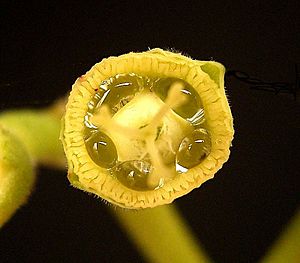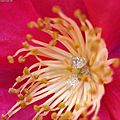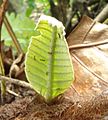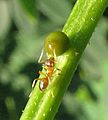Nectar facts for kids
Nectar, in botany, is a liquid made by the flowers of plants. It is sweet because it has sugar in it. Plants make nectar to attract pollinating animals. It is made in glands called nectaries. The nectaries are usually at the bottom of the perianth of the flower. This means the animal trying to get the nectar has to touch the parts of the plant that are used for reproduction. By doing this, the animal getting the nectar helps the plants reproduce.
Some plants make nectar outside the flower. These plants do it to attract predatory insects. These insects will eat both the nectar and any plant-eating insects found near the plant.
Nectar is economically important because it is where the sugar for honey comes from. It is also useful in agriculture and horticulture because the adults of many predatory insects, as well as hummingbirds, eat nectar. Some plants give off very rich scents.
Extrafloral nectaries
Extrafloral nectaries (not in the flower) are specialised nectar-secreting plant glands. They develop outside flowers, and are not involved in pollination.
In contrast to floral nectaries, nectar produced outside the flower generally has a defensive function. The nectar attracts predatory insects which will eat both the nectar and any plant-eating insects around, they work as 'bodyguards'.
Extrafloral nectaries have been reported in over 3941 species of vascular plants belonging to 745 genera and 108 families, 99.7% of which belong to flowering plants (angiosperms). This is 1.0 to 1.8% of all known species. They are most common among eudicots, occurring in 3642 species (of 654 genera and 89 families). They often occur in rosids.
Images for kids
-
Nectar of camellia
-
An Australian painted lady feeding on a flower's nectar
-
Ants on extrafloral nectaries in the lower surface of a young Drynaria quercifolia frond
-
Loxura atymnus butterflies and yellow crazy ants consuming nectar secreted from the extrafloral nectaries of a Spathoglottis plicata bud
-
Nylanderia flavipes ant visiting extrafloral nectaries of Senna
See also
 In Spanish: Néctar (botánica) para niños
In Spanish: Néctar (botánica) para niños








